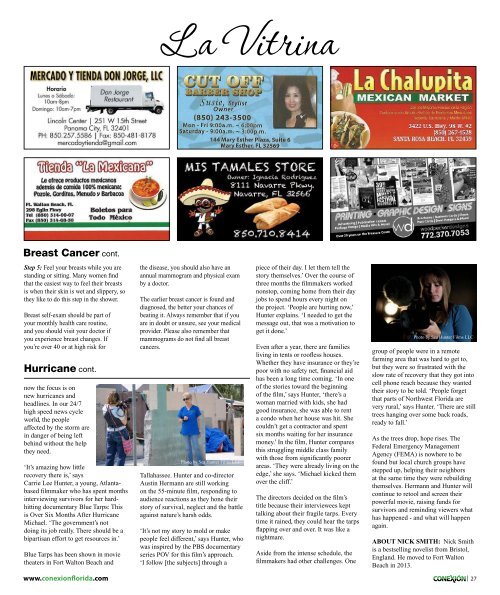You also want an ePaper? Increase the reach of your titles
YUMPU automatically turns print PDFs into web optimized ePapers that Google loves.
Breast Cancer cont.<br />
Step 5: Feel your breasts while you are<br />
standing or sitting. Many women find<br />
that the easiest way to feel their breasts<br />
is when their skin is wet and slippery, so<br />
they like to do this step in the shower.<br />
Breast self-exam should be part of<br />
your monthly health care routine,<br />
and you should visit your doctor if<br />
you experience breast changes. If<br />
you’re over 40 or at high risk for<br />
Hurricane cont.<br />
now the focus is on<br />
new hurricanes and<br />
headlines. In our 24/7<br />
high speed news cycle<br />
world, the people<br />
affected by the storm are<br />
in danger of being left<br />
behind without the help<br />
they need.<br />
‘It’s amazing how little<br />
recovery there is,’ says<br />
Carrie Lee Hunter, a young, Atlantabased<br />
filmmaker who has spent months<br />
interviewing survivors for her hardhitting<br />
documentary Blue Tarps: This<br />
is Over Six Months After Hurricane<br />
Michael. ‘The government’s not<br />
doing its job really. There should be a<br />
bipartisan effort to get resources in.’<br />
Blue Tarps has been shown in movie<br />
theaters in Fort Walton Beach and<br />
the disease, you should also have an<br />
annual mammogram and physical exam<br />
by a doctor.<br />
The earlier breast cancer is found and<br />
diagnosed, the better your chances of<br />
beating it. Always remember that if you<br />
are in doubt or unsure, see your medical<br />
provider. Please also remember that<br />
mammograms do not find all breast<br />
cancers.<br />
Photo by Sea Hunter Films LLC<br />
Tallahassee. Hunter and co-director<br />
Austin Hermann are still working<br />
on the 55-minute film, responding to<br />
audience reactions as they hone their<br />
story of survival, neglect and the battle<br />
against nature’s harsh odds.<br />
‘It’s not my story to mold or make<br />
people feel different,’ says Hunter, who<br />
was inspired by the PBS documentary<br />
series POV for this film’s approach.<br />
‘I follow [the subjects] through a<br />
piece of their day. I let them tell the<br />
story themselves.’ Over the course of<br />
three months the filmmakers worked<br />
nonstop, coming home from their day<br />
jobs to spend hours every night on<br />
the project. ‘People are hurting now,’<br />
Hunter explains. ‘I needed to get the<br />
message out, that was a motivation to<br />
get it done.’<br />
Even after a year, there are families<br />
living in tents or roofless houses.<br />
Whether they have insurance or they’re<br />
poor with no safety net, financial aid<br />
has been a long time coming. ‘In one<br />
of the stories toward the beginning<br />
of the film,’ says Hunter, ‘there’s a<br />
woman married with kids, she had<br />
good insurance, she was able to rent<br />
a condo when her house was hit. She<br />
couldn’t get a contractor and spent<br />
six months waiting for her insurance<br />
money.’ In the film, Hunter compares<br />
this struggling middle class family<br />
with those from significantly poorer<br />
areas. ‘They were already living on the<br />
edge,’ she says. ‘Michael kicked them<br />
over the cliff.’<br />
The directors decided on the film’s<br />
title because their interviewees kept<br />
talking about their fragile tarps. Every<br />
time it rained, they could hear the tarps<br />
flapping over and over. It was like a<br />
nightmare.<br />
Aside from the intense schedule, the<br />
filmmakers had other challenges. One<br />
Photo by Sea Hunter Films LLC<br />
group of people were in a remote<br />
farming area that was hard to get to,<br />
but they were so frustrated with the<br />
slow rate of recovery that they got into<br />
cell phone reach because they wanted<br />
their story to be told. ‘People forget<br />
that parts of Northwest Florida are<br />
very rural,’ says Hunter. ‘There are still<br />
trees hanging over some back roads,<br />
ready to fall.’<br />
As the trees drop, hope rises. The<br />
Federal Emergency Management<br />
Agency (FEMA) is nowhere to be<br />
found but local church groups have<br />
stepped up, helping their neighbors<br />
at the same time they were rebuilding<br />
themselves. Hermann and Hunter will<br />
continue to retool and screen their<br />
powerful movie, raising funds for<br />
survivors and reminding viewers what<br />
has happened - and what will happen<br />
again.<br />
ABOUT NICK SMITH: Nick Smith<br />
is a bestselling novelist from Bristol,<br />
England. He moved to Fort Walton<br />
Beach in 2013.<br />
www.conexionflorida.com<br />
| 27


















